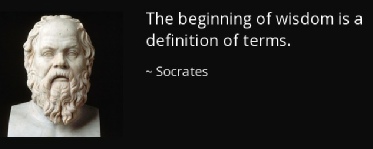



 NEXT
NEXT
 BACK
BACK
 Forum
Forum


Philosophical musings on Quanta & Qualia; Materialism & Spiritualism; Science & Religion; Pragmatism & Idealism, etc.




New coin for
novel context
Post 70. January 22, 2019
Why Coin Tech Terms?
Neologisms Shmeologisms
In the Enformationism thesis, and in the BothAnd Blog, I have coined a lot of new words (neologisms) as short-
For example "Soul" refers to the essence of a person. But it has come to imply a cartesian duality of body as vessel or container, and soul as captain & content. Since that is not how I understand the relationship of body and mind/soul, I prefer another common, but less compromised, word for a person. So I use “Self”1, which simply refers to the whole being, without any implication of division into parts. Soul is typically treated as a sacred spiritual substance (ghost; ectoplasm), while Self is merely a reference to the person in all aspects, mental & physical. In the glossary, I explicitly exclude the reductive dualistic connotations, and focus on the holistic unitary meaning. Moreover, I can define "Self" in technical terms of Information theory, and with reference to the usage of other writers, such as Terrence Deacon. This is not really a new word, but a more scientific alternative for an old word with mystical baggage.
I have also made-
That’s why I have constructed an extensive online glossary, with hyperlinks and cross-
End of Post 70
1. Self versus Soul :
For reasons similar to my own, Terrence Deacon, in his Incomplete Nature, used the common self-
Jeremy Sherman’s sequel was entitled, Neither Ghost Nor Machine, But I interpret Deacon’s definition to imply that the Self/Soul is both Ghost and Machine, both Spirit and Matter. It’s the combination of an attractive force and physical substance that causes Life and Mind to emerge from dead matter.
By “absential”, Deacon means “aboutness”, a reference or relationship to something external to the point of perspective. Ironically, the “about” relation between Self & Other functions like a causal force, similar to the gravitational pull of two bodies in space.
Note to Self :
“Self” is a compact metaphor for all the complexity that is me. “Soul” is a supernatural metaphor for “Self”, which includes sacred and spiritual connotations. So, Self is more appropriate for use in non-

Enformation & EnFormAction :
Two sides of the same coinage.
Enformation is simply “Information” spelled with an “E” to indicate the active form of passive data. It’s equivalent to physical energy, in addition to meta-
EnFormAction is the same basic idea, but intended to be more general in its application. EFA is the force that propels the Cosmos on its journey of evolution from Alpha to Omega, nothing to every-
Why two words for the same concept? Not to be prolix, but to be specific. In fact, Enformy is another variation on the same idea, but coined to avoid the ungainly conventional term, Negentropy, which misses the point of my thesis.
Personal Note :
In Philosophy Now magazine [Feb/Mar2019], Martin Jenkins began his Ayn Rand article with : “It takes a bigger than average ego to consciously create a philosophy and give it a name of one’s own choosing.”
Although my IQ & ego are minuscule compared with Taleb and Rand, I have created a personal philosophy and labeled it with a neologism : Enformationism. But to avoid unflattering com-
